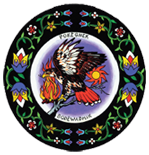Talking circles have long facilitated peaceful discussions and community gatherings. The circles have been a place of equality, and now they will serve as a model for the Tribal Courts as it brings back a tradition from long ago: Native Justice.
What is it?
Native Justice, commonly referred to as Peacemaking, is an alternative route to justice and an entirely diferent way to define justice. It is how Natives resolved conflicts before the Europeans came.
The Pokagon Band is bringing Native Justice back into the community. It will be how we resolve disputes between citizens, without using the Tribal Courts. It utilizes ceremonial traditions, talking circles, and circle keepers to bring people involved in disputes to common ground.
We have broken it into three strands: Native Justice for Court, Native Justice Community Conflict and Dispute Resolution Forum, and Native Justice Community Education and Awareness.
The Native Justice Community Conflict and Dispute Resolution Forum is what citizens and community members can use to resolve disputes among each another.
What kinds of disputes is it for?
Citizens can use the Native Justice forum for civil disputes before coming to the court.
The court will continue to handle criminal cases, but the court encourages citizens to seek the Native Justice forum for their civil disputes.
Why is this better than using a court?
American court systems focus on determining a winner and a loser, potentially destroying relationships, but the Native Justice forum strives to preserve the tribal community and the relationships within.
How can I be involved?
Circle keepers serve as facilitators in the talking circles, and they should be culturally informed, honest, respected, have life experience, and have knowledge of available Pokagon Band programs for the participants.
Circle keepers are not judges; they do not decide the outcome. Those involved in the dispute will determine their solution. They will each set standards and be expected to adhere to those, and they will also design the consequences if they do not.
People seeking use of the Native Justice forum are expected to be patient, responsive, respectful, open-minded, solution-oriented, engaged, equal, mentally present, actively listen, know there is support and alternate solutions.
If you’d like to be more involved in the revitalization of Native Justice in the Pokagon Band community, please contact Jason S. Wesaw, Peacemaking Coordinator, at (269) 462-4318.
Click here for a list of Resources
